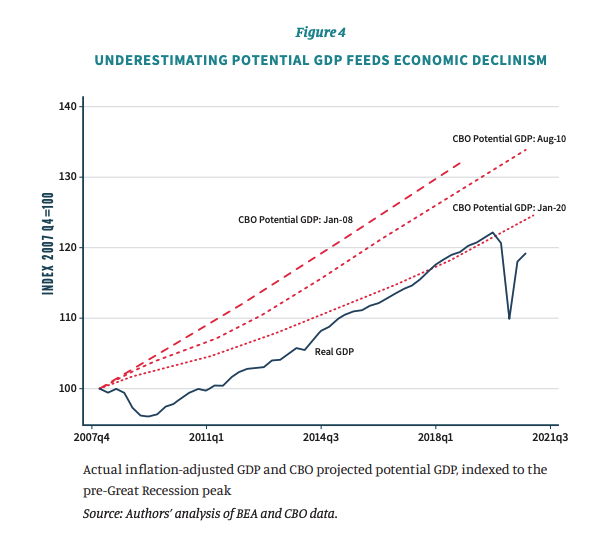It& #39;s time for our government to build a just, inclusive, and sustainable economy. The #AmericanJobsPlan is a step in the right direction. But @adamshersh & I explain in a new @Groundwork paper why it& #39;s far too small to meet the moment. Thread time. https://groundworkcollaborative.org/resource/room-to-run/">https://groundworkcollaborative.org/resource/...
First, let& #39;s talk about the problems. The nation is facing an economic crisis, an inequality crisis, a climate crisis, & a care crisis. Decades of denialism & delay have brought us to the brink of disaster.
The actual needs of the nation are precisely where we must start. What investments must be made to bring about rapid decarbonization? To transform our built environment? To bring about and sustain full employment? These are the questions Congress should be debating.
Based on a number of estimates, we show that the economy needs at least $10 trillion in new investments over the next decade. Biden& #39;s proposed $2 trillion is but a down payment. Will it help decarbonize? You bet. Will it create jobs? Absolutely. Will it be enough? NO WAY.
The costs of going too small are hard to overstate. We find that inadequate fiscal policy cost the economy at least $8 trillion over past decade – more than $32,000 in lost income per adult. What would you do with an extra $32,000?
Going too small leaves us all worse off. But those costs are not shared equally. As @adamshersh & I show, the burdens of a cold economy fall mainly on people of color and low income communities. On the flip side, the benefits of running a hot economy flow to precisely those ppl.
But don& #39;t just take our word for it, take the CBOs. The CBO estimates natural rates of unemployment for different demographic groups. The results are disgusting. The CBO bakes in racist assumptions, resulting in outrageous levels of unemployment for communities of color.
These estimates have profound influence on policymakers. The result? Black and brown communities are kept in persistent depression-like conditions. The economy is run cold, keeping labor down and out. Wage growth stagnates. And inequality spreads like wildfire.
But it doesn& #39;t need to be this way. In the report we argue persistent elevated levels of unemployment can be addressed via closing shortfalls in aggregate demand. How do you do that? BIG FISCAL POLICY, most of which should be deficit financed.
As a matter of fact, deficit financing most of the needs at hand - perhaps upwards of 5% of GDP/yr ($1T) would be a win-win-win: addressing our most pressing needs, generating full employment, and putting sustained upward pressure on wages.
This is precisely the best way to avoid running the economy below potential, which snowballs America& #39;s growing inequality crisis via perpetual wage and income stagnation.
In short, the spending on infrastructure modernization, deep decarbonization, & caregiving outlined in the report are not only the right things to do, but the right policies
to protect our planet & put America’s economy on
track toward a more equitable & prosperous future /end
to protect our planet & put America’s economy on
track toward a more equitable & prosperous future /end

 Read on Twitter
Read on Twitter



